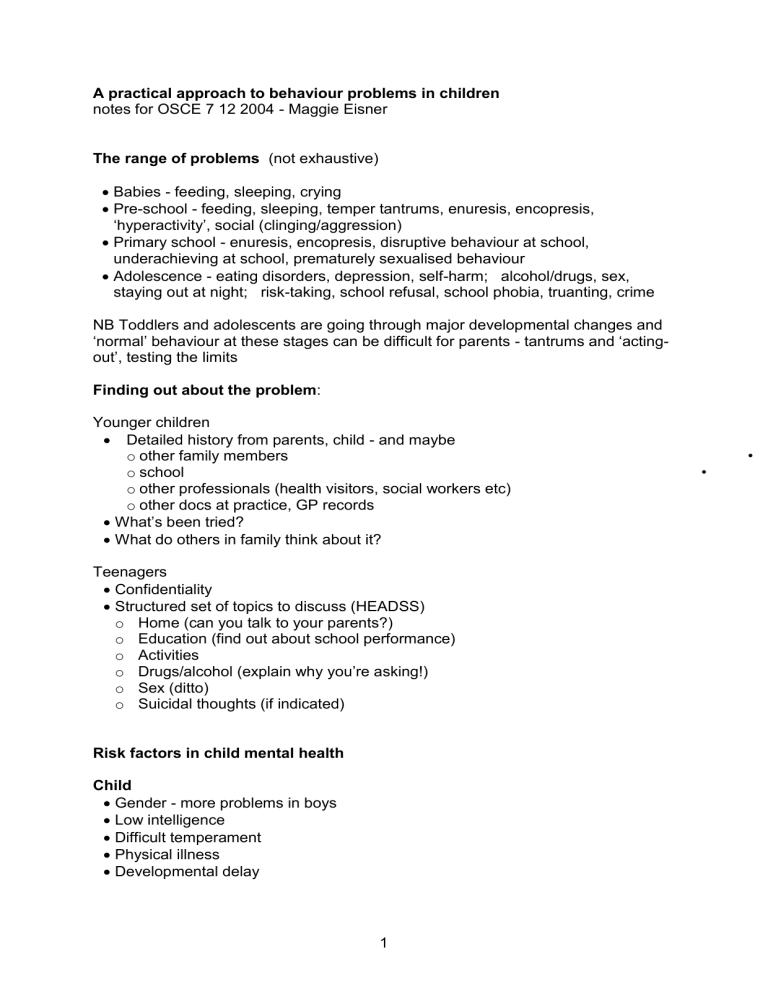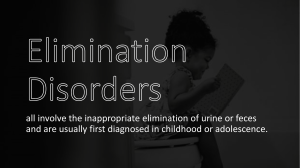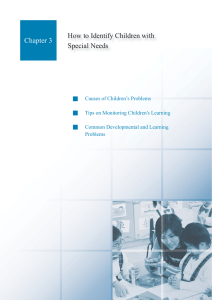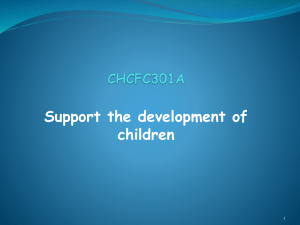child behaviour problems

A practical approach to behaviour problems in children notes for OSCE 7 12 2004 - Maggie Eisner
The range of problems (not exhaustive)
Babies - feeding, sleeping, crying
Pre-school - feeding, sleeping, temper tantrums, enuresis, encopresis,
‘hyperactivity’, social (clinging/aggression)
Primary school - enuresis, encopresis, disruptive behaviour at school, underachieving at school, prematurely sexualised behaviour
Adolescence - eating disorders, depression, self-harm; alcohol/drugs, sex, staying out at night; risk-taking, school refusal, school phobia, truanting, crime
NB Toddlers and adolescents are going through major developmental changes and
‘normal’ behaviour at these stages can be difficult for parents - tantrums and ‘actingout’, testing the limits
Finding out about the problem :
Younger children
Detailed history from parents, child - and maybe o other family members o school o other professionals (health visitors, social workers etc) o other docs at practice, GP records
What’s been tried?
What do others in family think about it?
Teenagers
Confidentiality
Structured set of topics to discuss (HEADSS) o Home (can you talk to your parents?) o Education (find out about school performance) o Activities o Drugs/alcohol (explain why y ou’re asking!) o Sex (ditto) o Suicidal thoughts (if indicated)
Risk factors in child mental health
Child
Gender - more problems in boys
Low intelligence
Difficult temperament
Physical illness
Developmental delay
•
•
1
Family
Traumatic stress (death/loss/change)
Ineffective parenting (inconsistent, punitive)
Family disharmony/parental separation/divorce (esp. with violence between parents)
Parental ill-health (esp mental health)
Family isolation - lack of other caring adults
Environment
Social deprivation (poverty, poor housing, lack of transport, poor nutrition, lack of playspace)
Problems in relationships with peers
Cultural conflict for children whose parents weren’t born here
Stresses (racism, war etc)
Media (TV couch potatoes, role models, violence, brain development, advertising)
What can we do?
listening, empathy, supportive counselling
Reassurance - common problems, developmental stages
Exclude physical disease
Manage existing physical disease well
Maintain a family perspective - who is the patient?
Treatment in GP - simple behavioural approaches (star charts), very rarely drugs
non-medical help - parent and toddler group, playgroup, holiday playschemes, activities for children (Scouts etc), activities for isolated parents, Gingerbread
(single parents ), Women’s Aid (domestic violence), etc
liaise with Health Visitor
refer to Sure Start (under 5s)
refer to Social Services (e g for Family Centre places)
practical support/advocacy - eg for rehousing or for change of school
refer to specialist counselling services for partic problems - eg continence clinic, childhood bereavement, survivors of child abuse
refer to Child and Adolescent psych. Service (screening via School Nurses and
Hvs)
A useful resource on this subject is
Child mental health problems - a booklet on child psychiatry problems for GPs by T.Hughes, M.E.Garralda, A.Tylee (1994) but I don’t know if it’s still available
2











